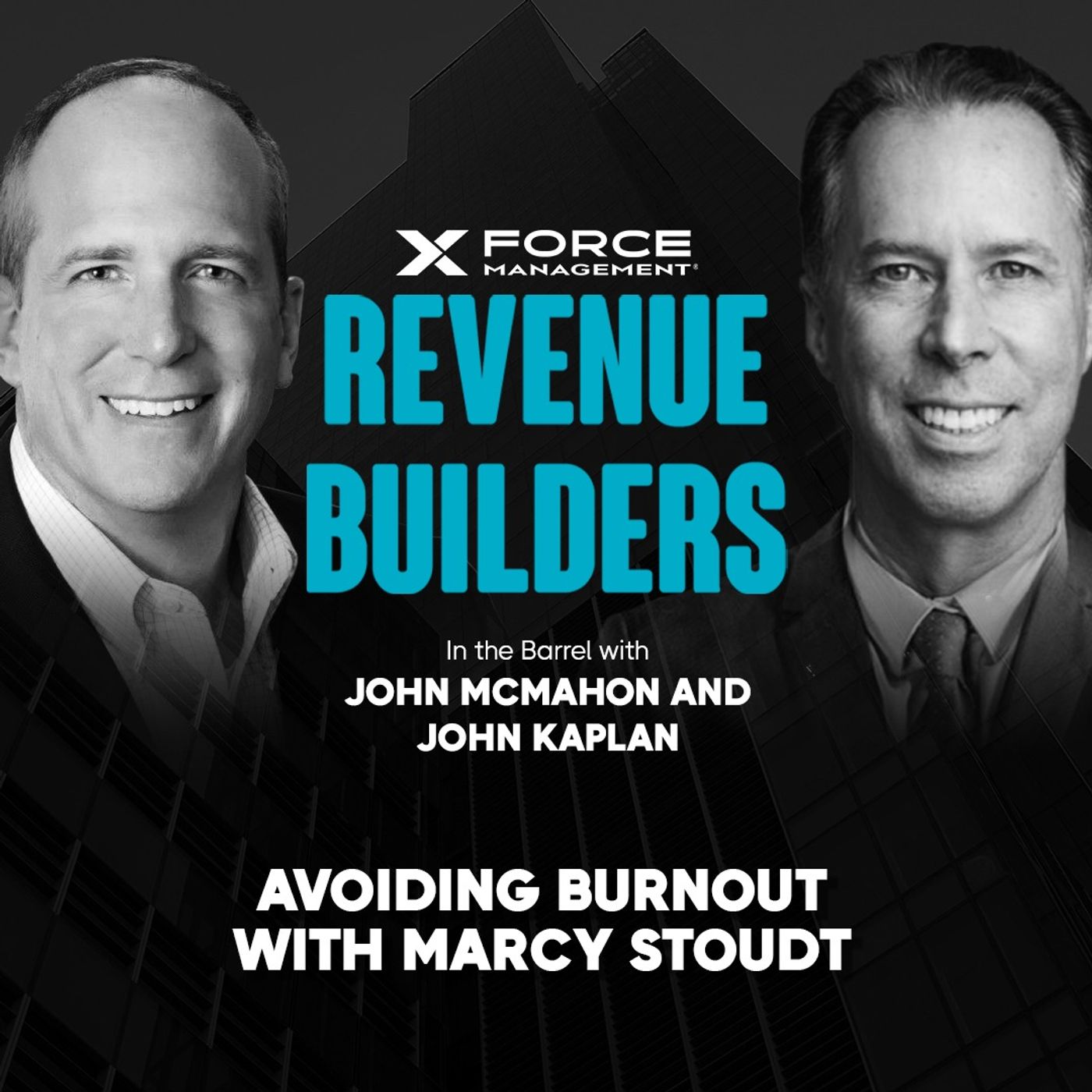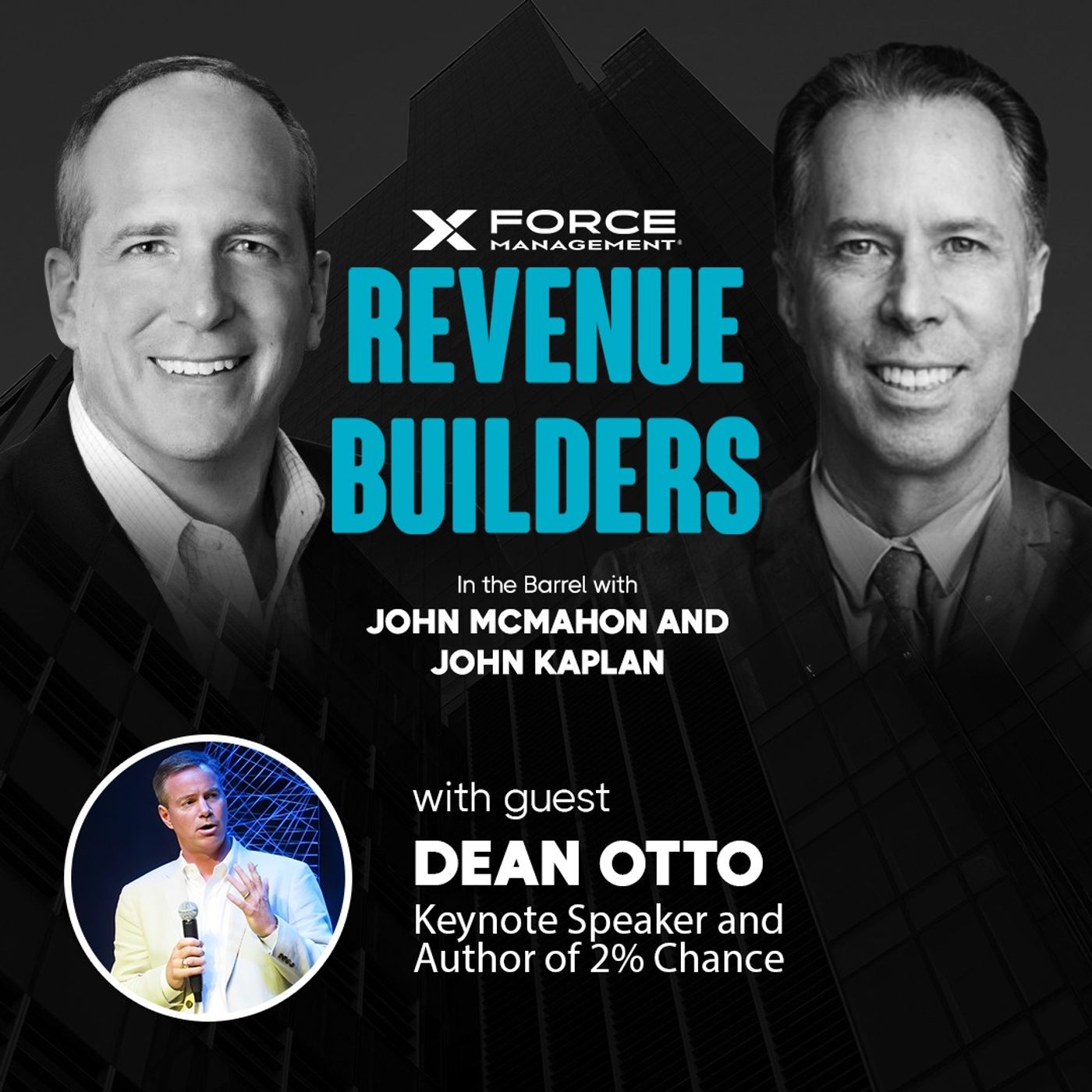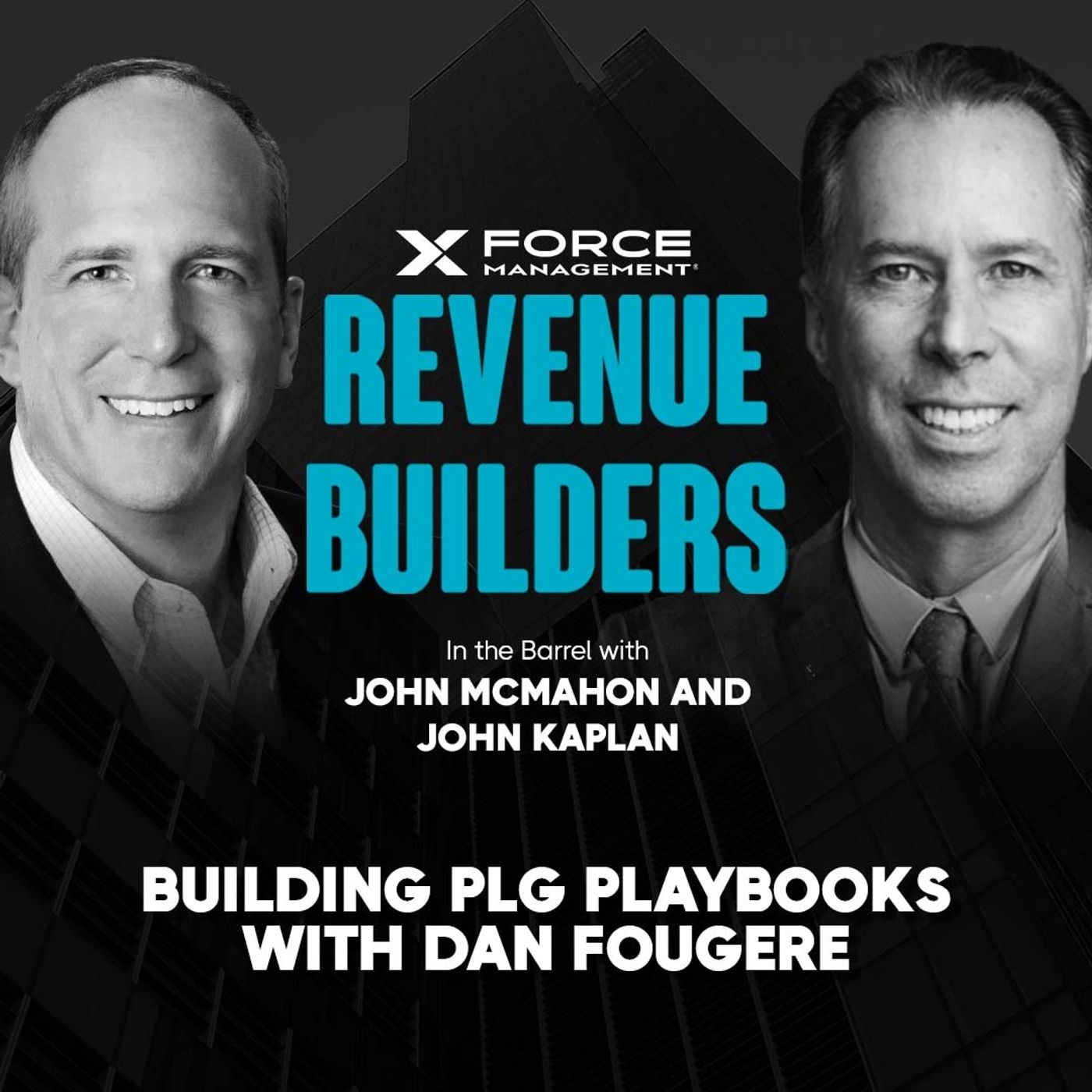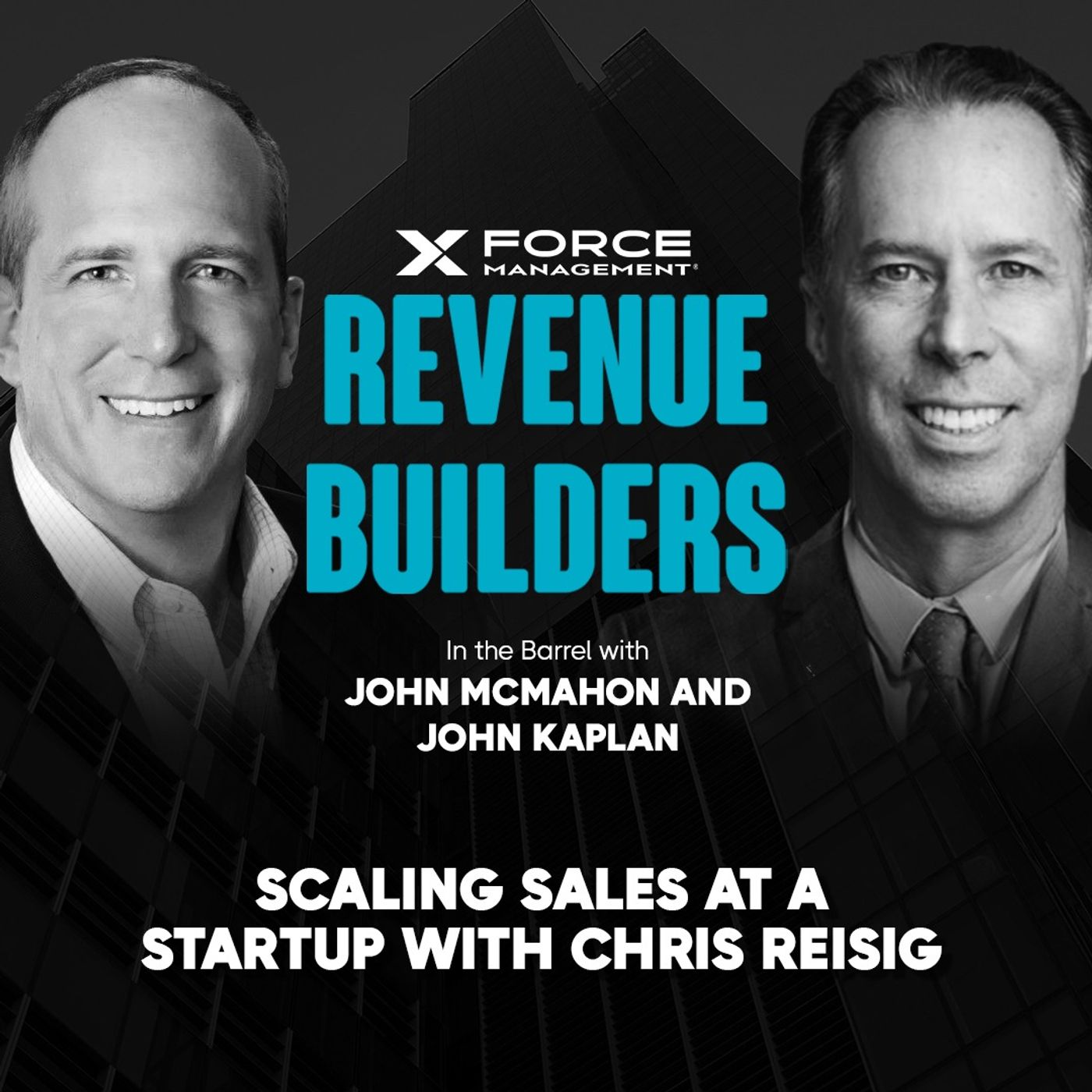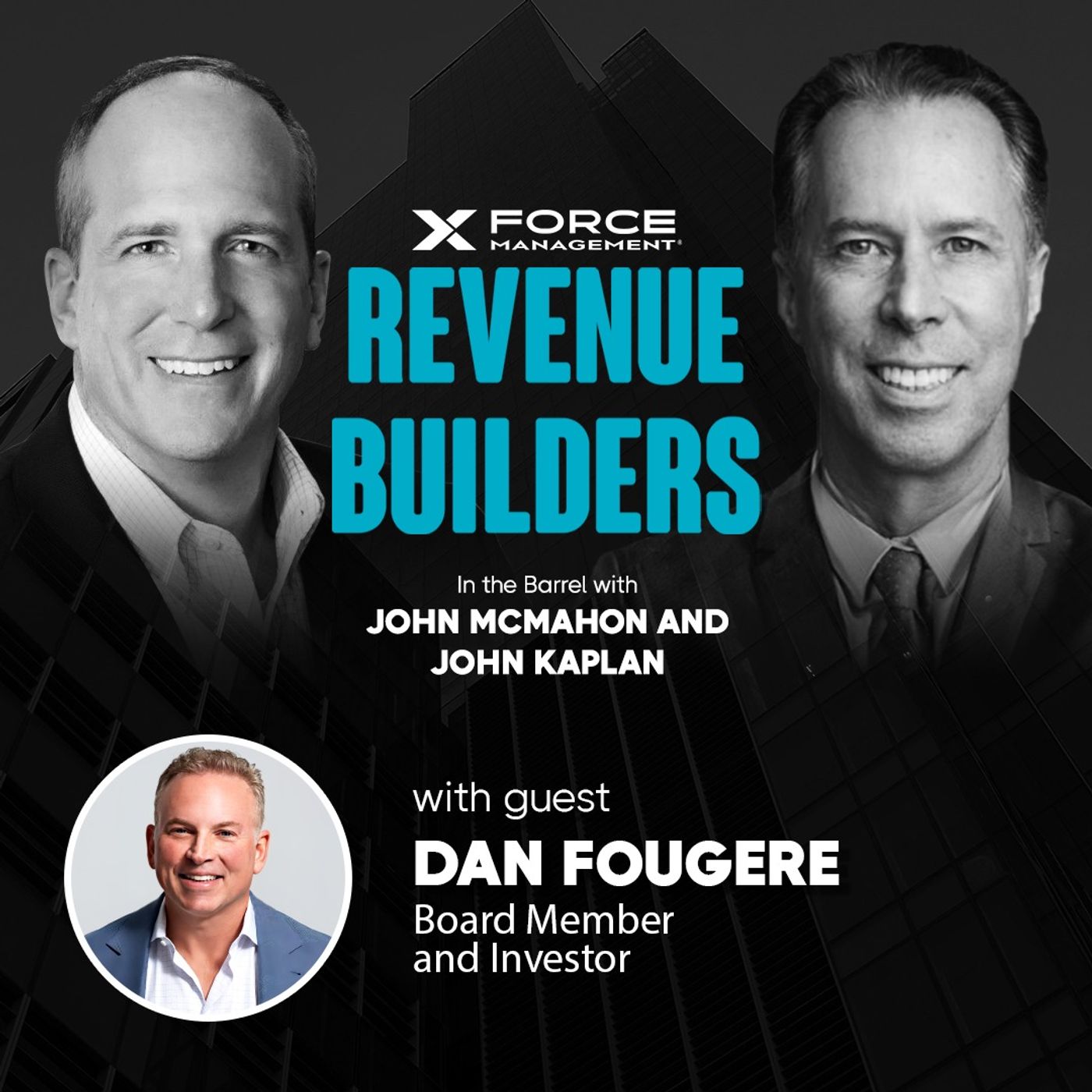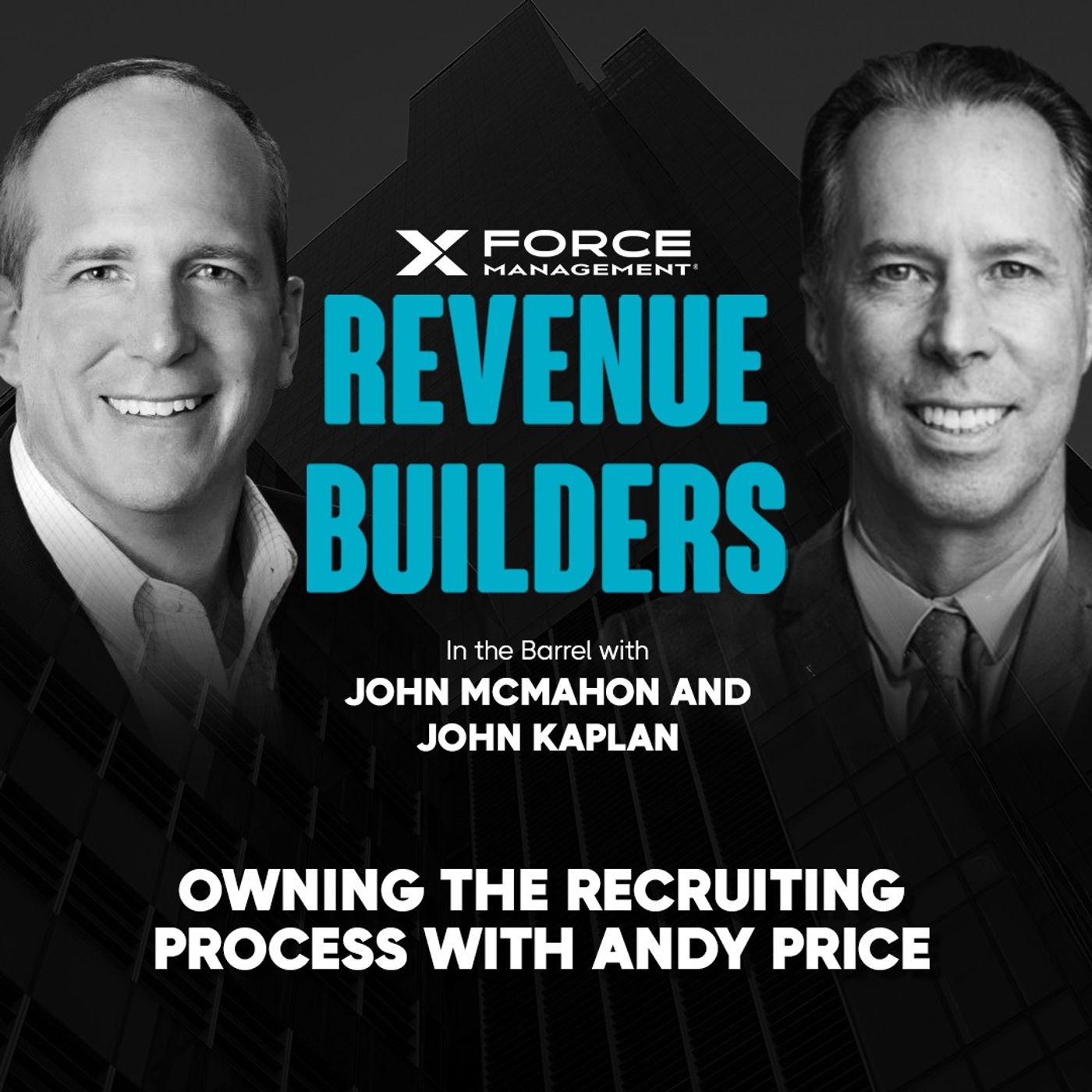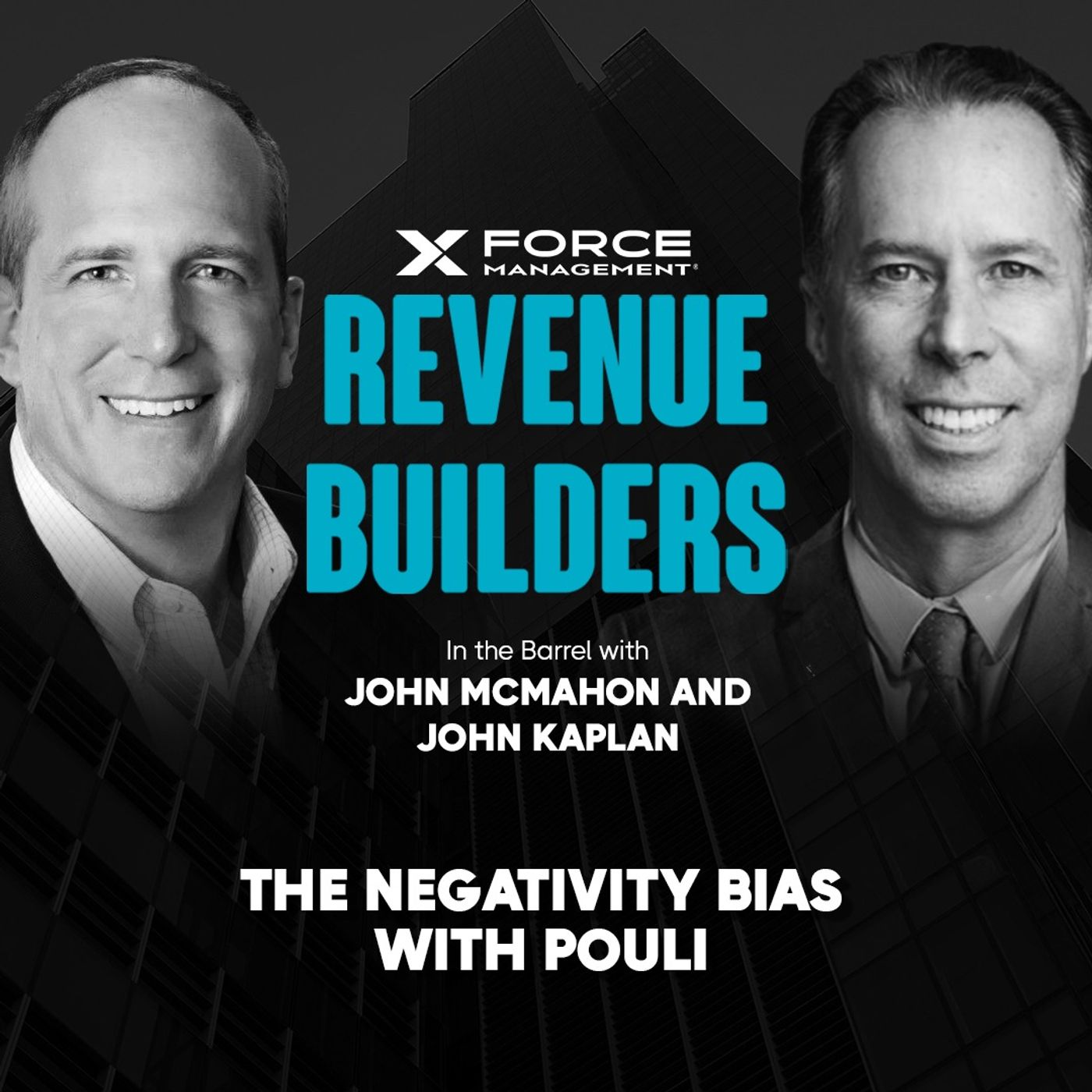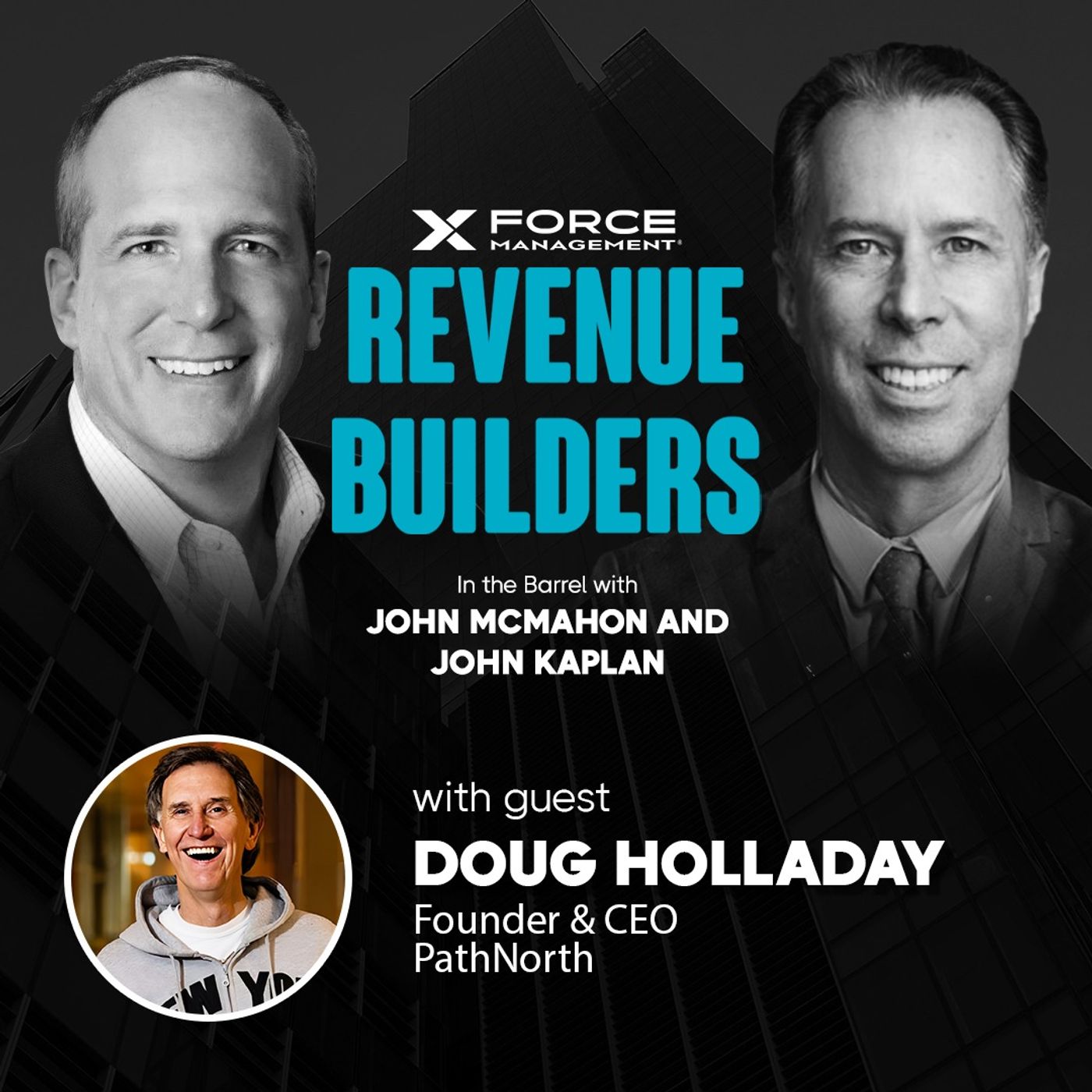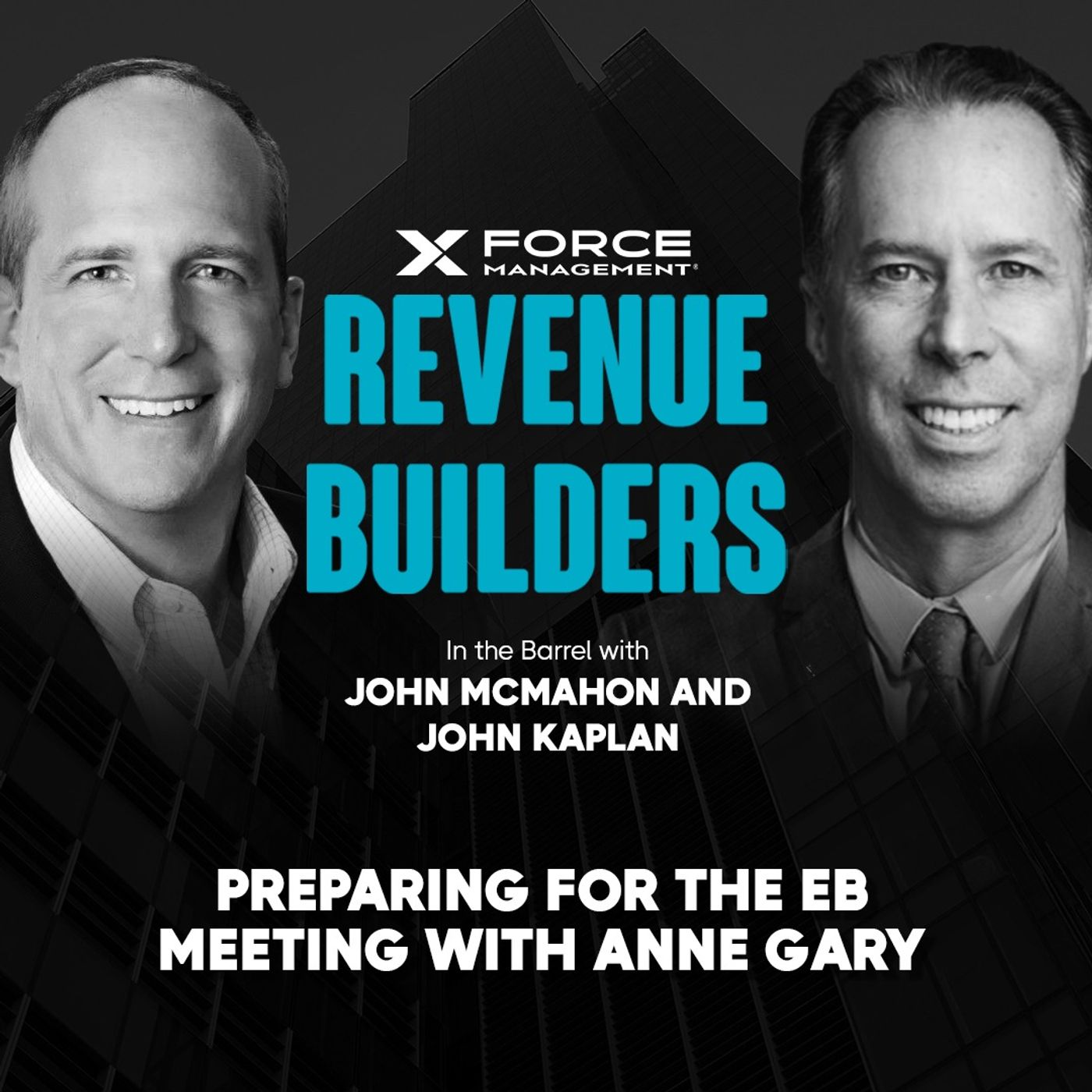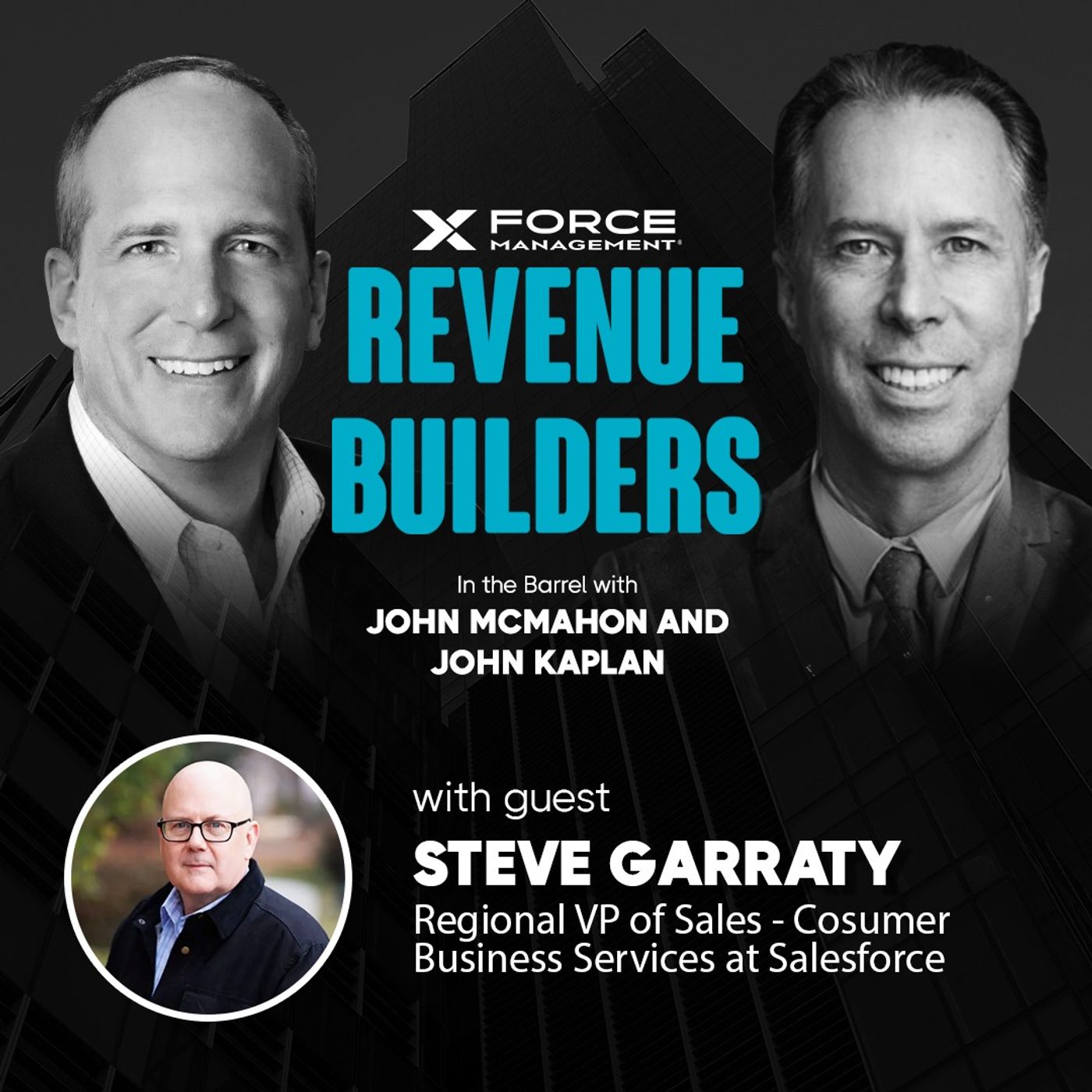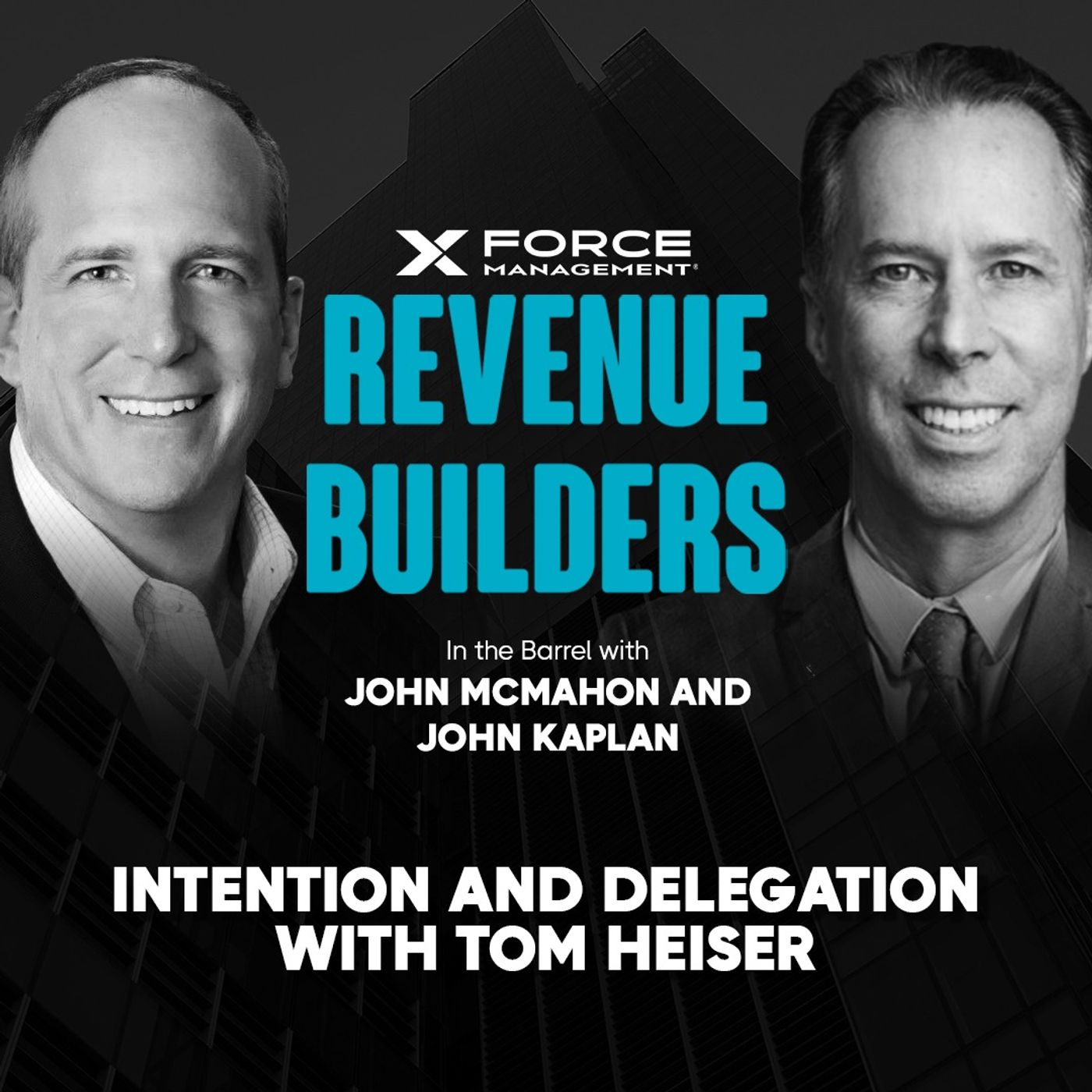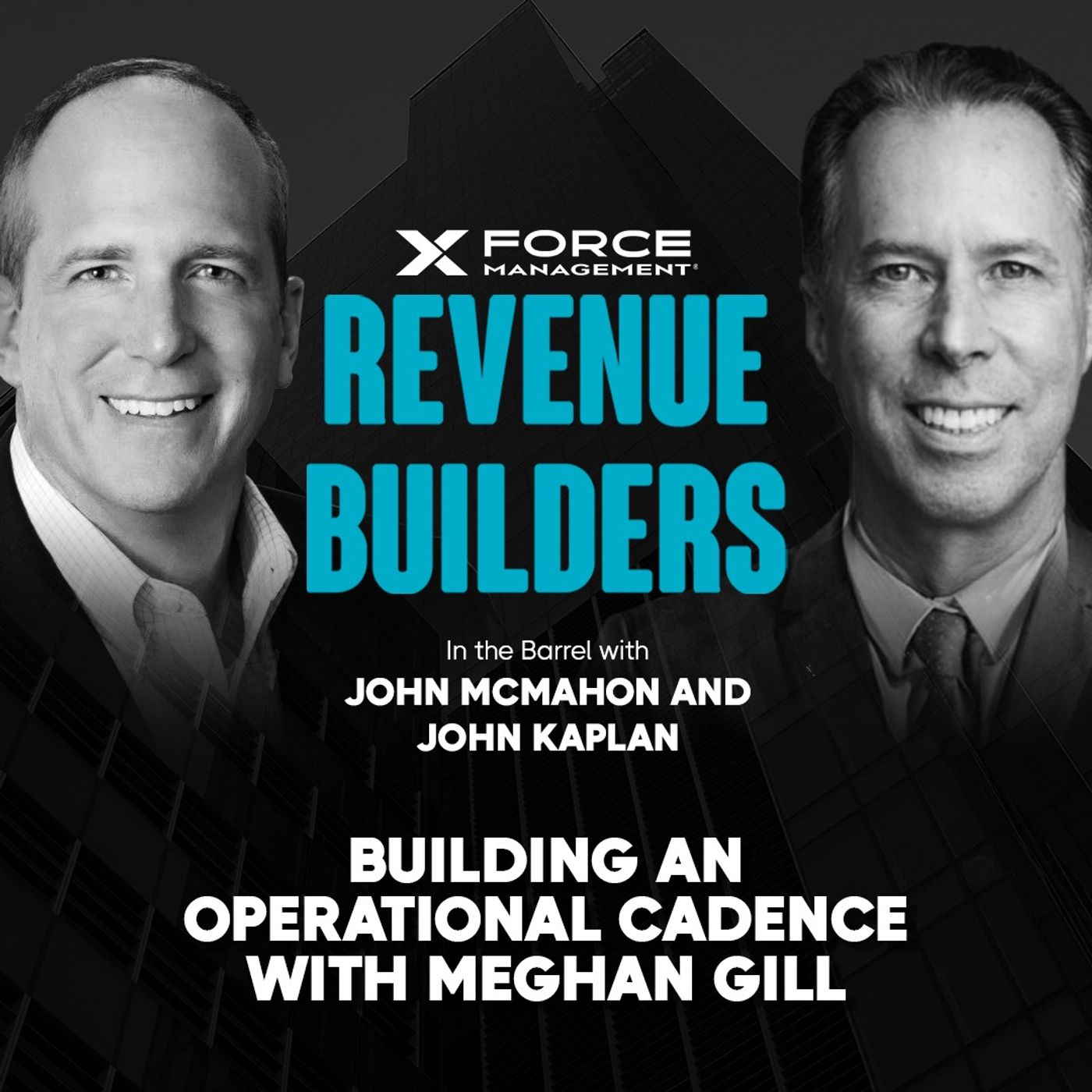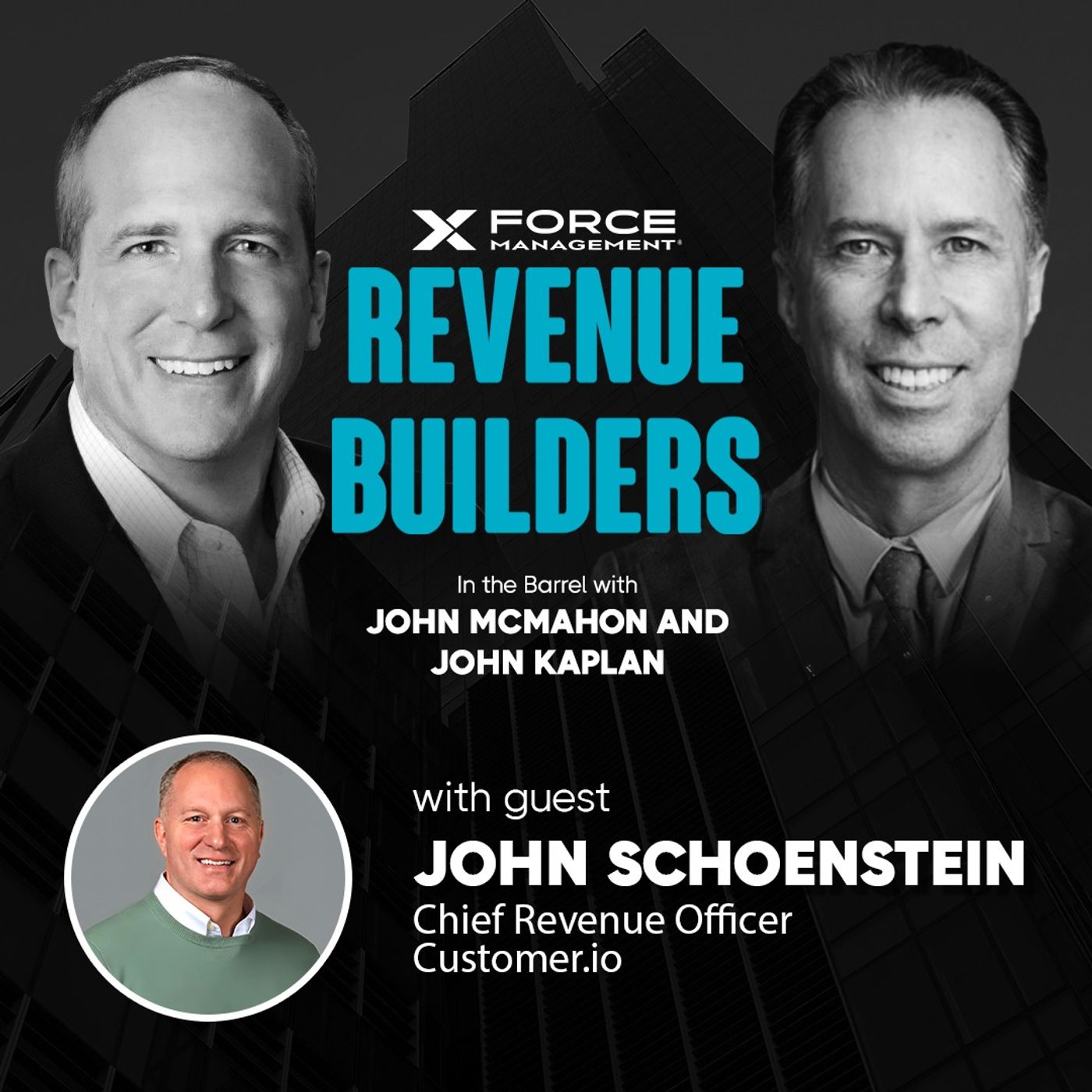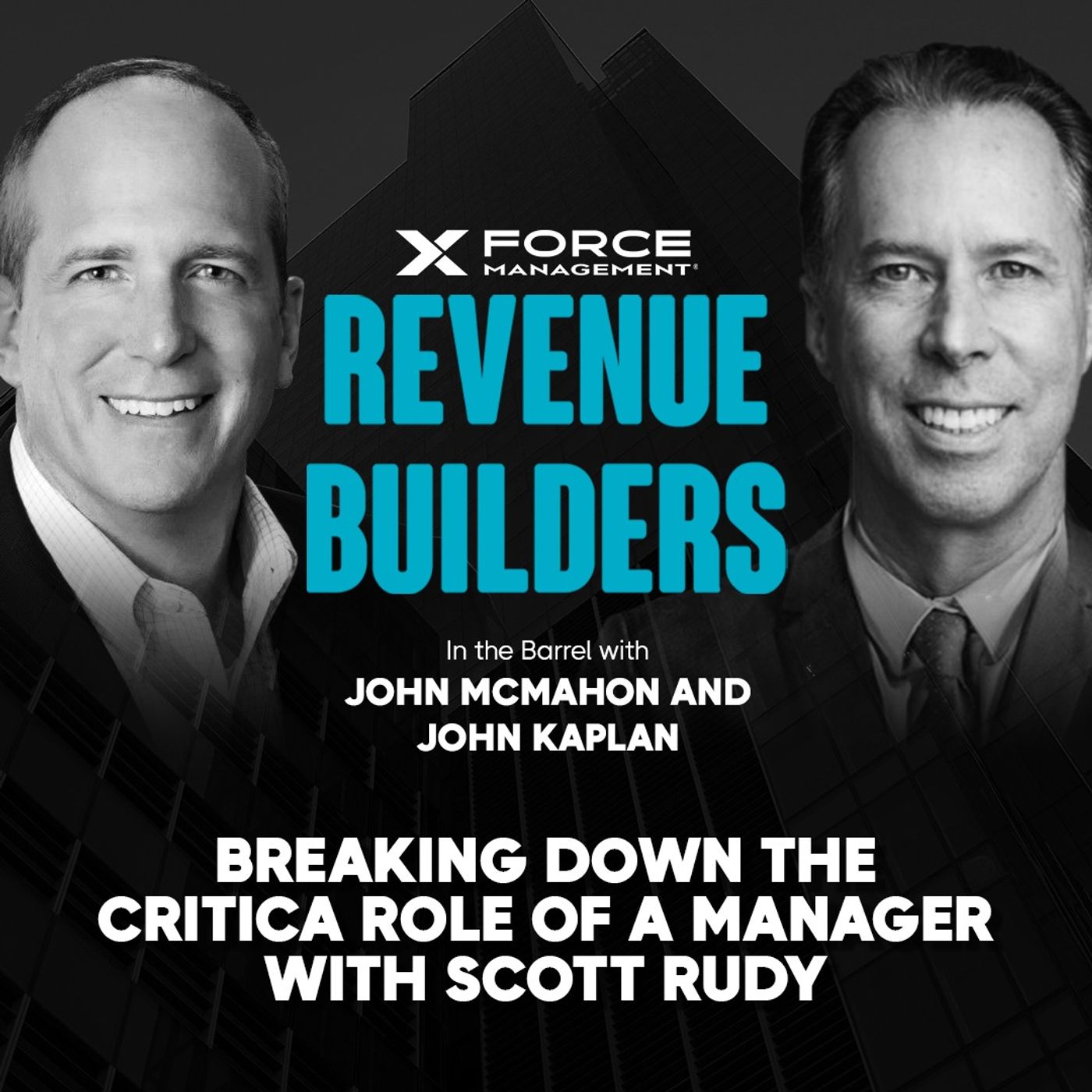Discover Revenue Builders
Revenue Builders

Revenue Builders
Author: Force Management
Subscribed: 65Played: 3,524Subscribe
Share
© 2022 - Force Management
Description
Welcome to the Revenue Builders podcast, a weekly show featuring B2B sales leaders and executives. Hosted by Five-time CRO John McMahon and Force Management’s Co-Founder John Kaplan, the show goes in the barrel, behind the scenes with the people who have been there, done that and seen the results. Revenue Builders covers the best practices for scaling and growing your business, while sharing the pitfalls to avoid. Great conversation. Solid interviews. Tangible takeaways to help you succeed. If you enjoy our content, please subscribe, rate and review the show to help us reach more people.
This show is brought to you by: Force Management where we help companies improve sales performance, executing their growth strategy at the point of sale. Check out forcemanagement.com more information
This show is brought to you by: Force Management where we help companies improve sales performance, executing their growth strategy at the point of sale. Check out forcemanagement.com more information
300 Episodes
Reverse
In this special Revenue Builders Rewind episode, we revisit our powerful first conversation with Doug Holladay, CEO & founder of PathNorth and author of Rethinking Success: Eight Essential Practices for Finding Meaning in Work and Life. Doug shares his unconventional career journey and explores his philosophy on leadership, purpose, and living a more intentional life.The discussion dives into the importance of authenticity, gratitude, and meaningful relationships, as well as the value of understanding your own story and embracing vulnerability. Doug also highlights why many people need to rethink how they define both personal and professional success. He offers practical exercises for uncovering purpose and explains how simple rituals can help ground your life in reflection and gratitude.Stay tuned for more episodes with Doug as we continue our series with him in 2026.ADDITIONAL RESOURCESConnect with J. Douglas Holladay:https://www.linkedin.com/in/dougholladay/Listen to the earlier episodes with Doug - each one delves into a different aspect of successful business leadership: The Power of Gratitude: https://www.forcemanagement.com/the-power-of-gratitude-an-in-depth-discussion-with-douglas-holladayKnowing Your Story: https://revenue-builders.simplecast.com/episodes/know-your-story-to-achieve-true-success-with-doug-holladayRethinking Success and Finding Purpose: https://www.forcemanagement.com/rethinking-success-and-finding-purpose-with-doug-holladayLearn more about Doug’s CEO programs: https://www.pathnorth.com/Read the Guide on Six Critical Priorities for Revenue Leadership in 2026: https://hubs.li/Q03JN74V0Explore Force Management’s Free SKO Planning Resources: https://hubs.li/Q03K94cs0Enjoying the podcast? Sign up to receive new episodes straight to your inbox: https://hubs.li/Q02R10xN0HERE ARE SOME KEY SECTIONS TO CHECK OUT[00:03:38] Finding Purpose and Passion[00:04:27] Understanding Life Patterns[00:07:17] The Impact of Family Stories[00:18:48] Authentic Leadership and Vulnerability[00:34:10] The Importance of Knowing People's Stories[00:37:30] Understanding Personal Stories[00:38:34] Pandemic-Induced Self-Reflection[00:39:31] Pain as a Catalyst for Change[00:41:14] Traits of Great Leaders[00:46:08] Founding PathNorth[00:56:55] The Power of Gratitude[01:03:24] Rapid Fire QuestionsHIGHLIGHT QUOTES[00:04:22] “Put your life in five-year blocks... What did you love doing and what did others say you were good at?”[00:06:59] “Most of us get eclipsed by the money chase.”[00:07:59] “If you don’t create space to think and feel, you’ll be one of those whose light goes out.”[00:10:50] “We’re all born in someone else’s story.”[00:13:21] “The story you have seen will be your family unless you break those patterns.”[00:16:13] “Our point of identity is not our strength, it’s our brokenness.”[00:18:37] “Meaning is what you want to go for. You can be in the most godawful situations and still find meaning.”[00:22:17] “Everybody has a story. The most successful people are the ones who let people tell their stories.”[00:27:09] “When the price of making more begins to do bad things to my soul, it’s time to leave.”[00:28:40] “Gratitude is the only emotion that cannot share space with any other emotion.” Hosted by Simplecast, an AdsWizz company. See pcm.adswizz.com for information about our collection and use of personal data for advertising.
In this curated episode of the Revenue Builders Podcast, we talk burnout with Marcy Stoudt, CEO and co-founder of Revel Coach. Marcy helps leaders avoid burnout and become their best selves without sacrificing success in either area. In this segment, she covers a few tips for avoiding burnout.KEY TAKEAWAYS[00:00:27] Burnout affects individuals beyond just moms, particularly leaders who lose perspective and struggle to lead effectively when overwhelmed.[00:01:45] Your attitude towards upcoming challenges greatly influences burnout; maintaining a positive mindset is key.[00:02:25] Adopt a daily practice of living "above the line," clarifying your vision and taking action aligned with your desired self.[00:04:36] Recognize and address negative events and emotions that contribute to burnout, working to stay "above the line."[00:05:55] Clear clutter from your schedule, aligning commitments with your vision of success and avoiding unnecessary tasks.HIGHLIGHT QUOTES[00:01:03] "There's a fine line between working too hard and being addicted... It's real and you can't generically say how to prevent it."[00:02:47] "Living above the line... You're defining who you want to be more often."[00:05:19] "Clearing clutter from her calendar is really important and just doing it to align to her vision of success with no comparison."[00:07:34] "Being honest with yourself about the addiction... my inability to extricate myself... became a self-fulfilling prophecy."Listen to the full episode with Marcy Stoudt through this link:https://revenue-builders.simplecast.com/episodes/mastering-work-life-balance-with-marcy-stoudtCheck out John McMahon’s book here:Amazon Link: https://a.co/d/1K7DDC4Check out Force Management’s Ascender platform here: https://my.ascender.co/Ascender/ Hosted by Simplecast, an AdsWizz company. See pcm.adswizz.com for information about our collection and use of personal data for advertising.
In this episode of the Revenue Builders Podcast, our host John Kaplan is joined by Dean Otto, an endurance athlete with a background in senior strategic global account sales. Dean shares his journey of recovery after a near-fatal cycling accident that left him with a 2% chance of ever walking again. His incredible story is a testament to the power of resilience and purpose, from overcoming immense physical challenges to running a half-marathon with the driver who hit him and the surgeon who saved his life. Dean provides insights into his mindset, the importance of community and forgiveness, and how he's turned his adversity into a mission to help others. The episode also delves into his guiding principles of courage, commitment, conditioning, and the importance of intellectual and spiritual fitness. Tune in for a powerful and motivational story of overcoming the odds.ADDITIONAL RESOURCESBuy Dean’s Book and Book Dean as a Speaker: https://deanottospeaking.com/Connect with Dean: linkedin.com/in/deanottospeakingRead the Guide on Six Critical Priorities for Revenue Leadership in 2026: https://hubs.li/Q03JN74V0Explore Force Management’s Free SKO Planning Resources: https://hubs.li/Q03K94cs0Enjoying the podcast? Sign up to receive new episodes straight to your inbox: https://hubs.li/Q02R10xN0HERE ARE SOME KEY SECTIONS TO CHECK OUT[00:01:15] Meet Dean Otto: A Story of Resilience[00:02:32] The Life-Changing Accident[00:06:00] Dean's Journey to Recovery[00:08:57] Overcoming Addiction and Finding Support[00:15:40] The Power of Forgiveness and Reconciliation[00:17:49] Miraculous Recovery and New Beginnings[00:33:32] Comeback Race and Heart Condition[00:34:07] Four Perspectives in the Book[00:34:56] Half Marathon Achievement[00:37:46] Turning Adversity into a Mission[00:39:16] Seizures and Medical Challenges[00:42:31] Speaking Engagements and Impact[00:51:02] Framework for SuccessHIGHLIGHT QUOTES[00:06:18] "We always revert to our training—make your training intentional."[00:16:07] "Isolation is the biggest enemy."[00:30:59] "Courage just means showing up."[00:35:54] "I'm not an outcome guy. I'm an input guy."[00:36:10] "If I've got a great attitude and I take the next right action, chances are the outcome's gonna be pretty great." Hosted by Simplecast, an AdsWizz company. See pcm.adswizz.com for information about our collection and use of personal data for advertising.
In this segment, Dan Fougere breaks down how Product-Led Growth (PLG) fundamentally changes the traditional sales playbook. Drawing from his experience at Datadog and advising startups, he explains that PLG companies must rethink how they engage prospects—especially when users begin interacting with the product before any formal sales conversation.Dan emphasizes the importance of usage signals—such as downloading the product or reading documentation—as triggers for sales outreach. He also discusses the risk of force-fitting old playbooks into new environments and advocates for a first principles approach: understanding how users buy, how they use the product, and what commercial conversations are relevant at each stage.On this Veterans Day Week, check out one of the charities that’s important to Dan.https://www.nplboutdoors.org/The No Person Left Behind Outdoors charity works with combat veterans to provide outdoor experiences to foster camaraderie, promote wellness, and celebrate resilience. They do everything from hiking trips to Kilimanjaro to turkey hunts. Support their important work. Hosted by Simplecast, an AdsWizz company. See pcm.adswizz.com for information about our collection and use of personal data for advertising.
In this episode of the Revenue Builders Podcast, our hosts John Kaplan and John McMahon dive deep into the world of Sales Kickoff (SKO) events. They discuss the critical importance of aligning SKO content with sales rep needs, emphasizing that it should be more than just an event—it should be a holistic process aimed at motivating and educating the sales force. The conversation covers the significance of training, the role of tools and AI in sales, and the pivotal role of frontline managers in driving sales team performance. They also share practical advice on crafting effective compensation plans and highlight the essential skills and knowledge that sales reps need for success. The episode is a must-listen for B2B sales leaders who are preparing for the upcoming SKO season and looking to drive impactful results.ADDITIONAL RESOURCESExplore Force Management’s Free SKO Planning Resources: https://hubs.li/Q03K94cs0Read the Guide on Six Critical Priorities for Revenue Leadership in 2026: https://hubs.li/Q03JN74V0See Force Management’s SKO Results: https://hubs.li/Q03RQM-V0Enjoying the podcast? Sign up to receive new episodes straight to your inbox: https://hubs.li/Q02R10xN0HERE ARE SOME KEY SECTIONS TO CHECK OUT[00:01:15] Kickoff: SKO Season Insights[00:01:45] The Importance of SKO Planning[00:02:29] Effective SKO Content and Structure[00:08:28] Leveraging AI and Tools in Sales[00:18:58] Challenges in Sales Processes and Tools[00:28:13] Training and Development for Sales Success[00:37:11] The Brady Rule and Skill Development[00:37:52] Role Playing and Live Interactions[00:39:17] The Importance of Leading by Example[00:45:09] Essential Sales Skills[01:00:53] The Role of Frontline Sales Managers[01:06:16] The Importance of Comp PlansHIGHLIGHT QUOTES[00:02:29] "It's a process, not an event. As a CRO, use the SKO to motivate, align on goals, and focus on training—not just boring org charts."[00:04:37] "If you don't sit in the seat of the participant, you are going to bore people to tears."[00:11:18] "Don't tell me about another tool unless it's really going to help me sell."[00:47:21] "You have to figure out who is sitting in that audience, resonate with them, and know what outcome you want when the meeting is over."[01:20:21] "Listening is number one. Most people are awful listeners, and most salespeople can't wait to talk."[01:53:06] "The job of the frontline sales manager is so critical, and they're the last people to get trained."[01:59:45] "I cannot fathom going into an SKO at the beginning of the year and not having comp plans done." Hosted by Simplecast, an AdsWizz company. See pcm.adswizz.com for information about our collection and use of personal data for advertising.
In this episode of The Revenue Builders Podcast hosted by John McMahon and John Kaplan, Chris Reising, a five-time Chief Revenue Officer (CRO) with extensive experience in scaling sales at early-stage tech companies, shares invaluable insights into the challenges and strategies involved in scaling sales functions for startups. From finding product-market fit to hiring the right sales reps and understanding the importance of pain points, this conversation provides a comprehensive guide for entrepreneurs looking to grow their businesses.KEY TAKEAWAYS[00:01:17] In the early stages of a startup, you must wear multiple hats, including being a product manager and a sales professional. Understanding the ICP and gathering customer insights are crucial.[00:02:31] The early days of a startup involve learning every day, attending sales meetings, understanding objections, and identifying the value your technology brings. Effective communication with the product team is key.[00:04:05] Investor relations play a significant role. Early-stage investors look for different data points, and their feedback can be invaluable in understanding market signals.[00:06:11] The importance of prioritizing technology components based on customer pain points and the potential to generate immediate revenue.[00:07:44] Recognizing a recurring pattern in sales discussions where customers react positively to specific functionalities is a sign of repeatability and scalability.[00:09:05] Founders who want to remain deeply involved in the sales process need guidance on when to step back. It's a common challenge in early-stage startups.[00:12:42] Breaking down a grand vision into bite-sized chunks of value that address specific business problems is crucial for achieving repeatability and market success.[00:13:30] Expanding the vision is essential but keeping the framework simple enough for the market and sales team to understand and execute is key to early-stage success.[00:13:50] The importance of focusing sales efforts on the most productive areas and avoiding the mistake of spreading sales teams too thin.HIGHLIGHT QUOTES[00:06:56] "When you start to recognize a recurring pattern...you start to say, 'Now I have some sense of repeatability,' and that's really important."[00:10:08] "There's a huge difference between a first and second-time founder...you need to help them understand that stepping away is an important part of growing the business."[00:13:01] "Recognize you've got to break that big vision down into bite-sized chunks that can be digested by your go-to-market team and by the market, by customers."[00:13:30] "Where are we going to place our salespeople? Where are they going to be the most productive? That's really a key point."Listen to the full episode with Chris Reisig in this link:https://revenue-builders.simplecast.com/episodes/building-a-scalable-culture-with-chris-reisigEnjoying the podcast? Sign up to receive new episodes straight to your inbox:https://hubs.li/Q02R10xN0Check out John McMahon’s book here:Amazon Link: https://a.co/d/1K7DDC4 Hosted by Simplecast, an AdsWizz company. See pcm.adswizz.com for information about our collection and use of personal data for advertising.
In this episode of the Revenue Builders Podcast, our hosts John Kaplan and John McMahon are joined by Dan Fougere, a venture partner at Index Ventures and former CRO of Datadog. Dan shares insights from his extensive sales career, emphasizing the importance of developing adaptive and context-specific sales playbooks. He discusses the evolution of PLG (Product-Led Growth) strategies, the integration of AI in sales processes, and the critical need for continuous learning and adaptability. The episode also touches on Dan's philanthropic efforts, including his involvement with Homes for Our Troops and other charitable initiatives.ADDITIONAL RESOURCESConnect and learn more from Dan Fougere.Connect with Dan on LinkedIn: https://www.linkedin.com/in/danfougere/Support Homes For Our Troops: https://www.hfotusa.orgSupport Imagine Reading: https://imaginereading.com/Support No Person Left Behind Outdoors: https://www.nplboutdoors.orgRead the Guide on Six Critical Priorities for Revenue Leadership in 2026: https://hubs.li/Q03JN74V0Enjoying the podcast? Sign up to receive new episodes straight to your inbox: https://hubs.li/Q02R10xN0HERE ARE SOME KEY SECTIONS TO CHECK OUT[00:02:24] Advice for New Sales Leaders[00:02:52] Adapting Sales Playbooks[00:03:27] The Importance of Flexibility in Sales Strategies[00:03:54] Understanding Product-Led Growth (PLG)[00:06:44] Case Study: Datadog's Sales Evolution[00:07:57] Challenges in Scaling Sales Strategies[00:08:51] Building a Sales Organization for the Future[00:12:14] The Role of a CRO in Modern Sales[00:14:48] Adapting to Market Changes[00:26:23] Traits of Effective Sales Leaders[00:34:03] The Tip of the Spear: Leading from the Front[00:34:16] Medallia: Building a Sales Process from Scratch[00:36:58] Profile of a Successful Sales Leader[00:37:47] Recruiting and Building a High-Performance Team[00:39:25] The Importance of High Standards in Hiring[00:52:41] AI's Impact on Sales and Forecasting[01:02:07] Giving Back: Charitable EndeavorsHIGHLIGHT QUOTES[00:03:21] “A big mistake is trying to force fit a playbook from a previous company into a new company.”[00:06:01] “Approach it with a beginner’s mind… it’s actually an advantage you only get once.”[00:10:55] “Build your outbound before you need it, because at some point you’re going to need it.”[00:13:33] “98.5% of companies realize, ‘I wish I had a great sales organization to go with this great PLG motion.’”[00:19:07] “The thing that tops people out is the inability to adapt and collaborate—they become too rigid.”[00:22:25] “If you know in your heart your team is mediocre, you’re never going to be great. Raise those standards.”[00:31:36] “Don’t just assume you can get rid of BDRs and have AI do it. I don’t see anybody telling me that’s working yet." Hosted by Simplecast, an AdsWizz company. See pcm.adswizz.com for information about our collection and use of personal data for advertising.
In this curated episode of the Revenue Builders Podcast, John McMahon and John Kaplan are joined by Andy Price from Artisanal Ventures and Artisanal Talent. With over 30 years of experience in the recruiting industry, Andy shares valuable insights on why it's crucial for sales leaders to own the recruiting process. The discussion delves into the pitfalls of delegating recruitment to HR, the importance of building a strong internal talent acquisition team, and the impact of recruiting quality talent on overall sales success.KEY TAKEAWAYS[00:00:41] The Importance of Sales Leaders Owning the Recruiting Process[00:00:53] Pitfalls of Delegating Recruitment to HR[00:01:36] Building an Internal Talent Acquisition Muscle[00:02:15] The Impact of Economic Changes on Recruiting Strategies[00:02:53] The Importance of Consistency in Sales Team DNA[00:03:47] The Role of Networks in Successful Recruiting[00:05:02] Evaluating Sales Leaders Based on Their Recruiting Ability[00:04:16] The Consequences of Poor Recruiting on Sales Organizations[00:04:44] The Significance of Having a Vision for Talent DevelopmentHIGHLIGHT QUOTES[00:00:53] "You cannot delegate it to anybody else because you're recruiting your own team, and your team is going to determine your own success and your own career."[00:01:36] "The HR team was a central function, more administrative and compliance, comp benefits."[00:02:53] "You end up with inconsistent talent across the board and things start to vibrate."[00:03:29] "When you recruit a bunch of C's and D's, you're going to burn through a lot of money."[00:05:02] "Who are they going to bring? Who are they going to recruit?"[00:06:16] "Salespeople want to win."Listen to the full episode with Andy Price through this link: https://revenue-builders.simplecast.com/episodes/investing-in-the-future-of-b2b-software-with-andy-priceCheck out John McMahon’s book here:Amazon Link: https://a.co/d/1K7DDC4Check out Force Management’s Ascender platform here: https://my.ascender.co/Ascender/ Hosted by Simplecast, an AdsWizz company. See pcm.adswizz.com for information about our collection and use of personal data for advertising.
In this episode of the Revenue Builders Podcast, our hosts John Kaplan and John McMahon are joined by Susan Lucia Annunzio, the “CEO Whisperer” and President of the Center for High Performance. With over 25 years of expertise in leadership and organizational culture, Lucia shares her insights on fostering sustainable growth by treating people well, the importance of leveraging brain power, and the generational dynamics impacting today's workforce. They delve into strategies for leaders to harness the unique strengths of Gen Z, overcome organizational toxicity, and create environments where innovation and accountability thrive. Tune in to explore how to unlock potential within your teams and drive profitable growth.ADDITIONAL RESOURCESConnect with Susan Lucia Annunzio.LinkedIn: https://www.linkedin.com/in/susanannunzio/Learn more about the Center for High Performance: https://centerforhighperformance.com/ Get Lucia’s books: https://centerforhighperformance.com/category/books/Read the Guide on Six Critical Priorities for Revenue Leadership in 2026: https://hubs.li/Q03JN74V0Enjoying the podcast? Sign up to receive new episodes straight to your inbox: https://hubs.li/Q02R10xN0HERE ARE SOME KEY SECTIONS TO CHECK OUT[00:03:08] Lucia's Journey and Mission[00:06:18] The Importance of Treating People Well[00:08:22] Return on Brain Power[00:10:17] Challenges in Leadership and Management[00:30:25] Generational Differences and Gen Z[00:33:39] The Most Rejected Generation[00:34:23] Technological Savvy and Social Media Influence[00:36:03] Gen Z's Desire for Purpose and Socialization[00:37:53] The Impact of Overprotection and Fear[00:40:21] Work Environment and Remote Work Preferences[00:43:37] The Future of Work and Leadership[00:53:30] Empowering Gen Z in the WorkplaceHIGHLIGHT QUOTES[00:06:56] “A great strategy without allowing people to use their brains will never maximize its potential.”[00:08:41] “Companies leave money on the table because they don’t allow people to challenge assumptions.”[00:10:57] “The number one differentiator of sustainable growth... was the people in the group felt valued.”[00:13:41] “People work for people. When you look authentic, people begin to trust you.”[00:21:55] “Most Gen Zs prefer to work in person, learn socialization skills, and make friends.”[00:28:35] “Resilience comes from making mistakes, learning from them, and getting back up again. But when you make a mistake and people keep you down, you become a victim.”[00:32:32] “Ask for help. Tell your boss you want to be a star player and want to know what good looks like.”[00:38:13] “Anybody can be good. But how do you become great? That’s what’s going to give you satisfaction.” Hosted by Simplecast, an AdsWizz company. See pcm.adswizz.com for information about our collection and use of personal data for advertising.
In this episode of The Revenue Builders Podcast, join hosts John McMahon and John Kaplan as they explore the multifaceted world of sales champions with veteran sales leader and author Richard Rivera. Discover the nuances of champion dynamics, including the often-overlooked aspect of bias for action. Rivera breaks down the four champion tendencies—Complacent, Teaser, Protector, and Transformer—revealing strategies to navigate each and ensure successful deals.KEY TAKEAWAYS[00:01:02] Understanding the Bias for Action: Richard Rivera introduces the concept of bias for action in champions, emphasizing its crucial role in sales success.[00:02:29] The Defining Characteristics of a Champion: The importance of champions not just having power and influence but actively taking action on behalf of the salesperson.[00:03:36] Dimensions of Champion Tendencies: Rivera introduces a framework with two dimensions—appreciation for innovation and bias for action—to categorize champions into four tendencies.[00:05:59] The Protector Tendency: Exploring champions who take action but lean towards risk-averse decisions, and how to navigate objections from such individuals.[00:06:38] The Transformer: Rivera's favorite tendency, champions who prioritize innovation and have a bias for action, but with potential pitfalls. Strategies for dealing with Transformers in the sales process.[00:08:44] Selling in a Collective Yes Environment: Acknowledging the shift towards collective decision-making and the challenge of navigating the intricacies of multiple decision-makers and influencers.[00:11:19] Becoming the Protector: When dealing with Transformers, the importance of assuming a protector role—anticipating risks and ensuring a smooth decision-making process.[00:12:48] Early Challenges with Transformers: Highlighting the risk of Transformers going too early to the economic buyer and losing the deal due to lack of preparation.[00:14:37] What We Heard Concept: Introducing a mature approach to address potential conflicts with Transformers by referring back to shared understandings and perspectives.HIGHLIGHT QUOTES[00:03:16] "If they're not taking action, they are not being a champion for us."[00:06:18] "Recognize who you have and then fill their gaps."[00:09:10] "If you can't be with the one you love, love the one you're with."[00:13:46] "What we heard is a mature way to address potential conflicts."Here are the links to our full episodes with Richard Riverag: Part 1: https://revenue-builders.simplecast.com/episodes/developing-buyer-champions-with-richard-rivera-part-1Part 2: https://revenue-builders.simplecast.com/episodes/developing-elite-sales-habits-with-richard-rivera-part-2Check out Richard Rivera’s book here: https://www.amazon.com/CHAMPION-SELL-L-I-T-Building-Champions/dp/B0BV415V9M/ref=sr_1_1Check out John McMahon’s book here:Amazon Link: https://a.co/d/1K7DDC4Check out Force Management’s Ascender platform here: https://my.ascender.co/Ascender/ Hosted by Simplecast, an AdsWizz company. See pcm.adswizz.com for information about our collection and use of personal data for advertising.
In this episode of the Revenue Builders Podcast, our hosts John Kaplan and John McMahon dive into the intricacies of sales compensation plans with special guest Jose Fernandez, co-founder of Easy Comp. The discussion covers the primary purpose of sales compensation plans, the impact of incentives on sales behavior, and various strategies for aligning sales incentives with company goals. Jose shares examples from his experience at MongoDB, Intap, and Google, highlighting how tailored compensation plans can drive desired behaviors and increase sales productivity. The episode also touches on the challenges of transitioning to consumption-based models and the importance of clear, motivational, and actionable compensation plans for sales teams.ADDITIONAL RESOURCESConnect with Jose Fernandez.LinkedIn: https://www.linkedin.com/in/joseluisfernandez/Learn more about EasyComp: https://www.easycomp.ai/Read the Guide on Six Critical Priorities for Revenue Leadership in 2026: https://hubs.li/Q03JN74V0Read the Guide on Winning Government Contracts: https://bit.ly/3UYAOvOEnjoying the podcast? Sign up to receive new episodes straight to your inbox: https://hubs.li/Q02R10xN0HERE ARE SOME KEY SECTIONS TO CHECK OUT[00:01:44] Understanding Sales Compensation Plans[00:01:59] Driving Sales Behavior with Compensation[00:06:43] Aligning Compensation with Company Strategy[00:08:50] Simplifying Compensation Plans[00:12:19] Planning and Implementing Effective Compensation Plans[00:20:31] Leveraging Technology in Compensation Planning[00:27:01] Incentivizing Overachievers and Managing Churn[00:32:42] Understanding Sales Performance Metrics[00:33:49] The Debate on Sales Compensation Caps[00:35:30] Challenges with Sales Compensation Plans[00:36:46] Coaching Technical Founders on Sales[00:38:07] Celebrating Big Wins in Sales[00:45:32] The Role of Technology in Sales Compensation[00:49:01] The Shift to Consumption-Based Models[01:00:16] The Importance of Collaboration in Sales[01:01:26] Introducing EZ Comp and Its MissionHIGHLIGHT QUOTES[00:02:04] "Incentives drive behavior, and it does it in a very strong way."[00:03:09] "The first place they're going to go to figure out what they're supposed to do is their compensation letter."[00:05:14] "Simplicity is key. If they have to write it down, it's never gonna work."[00:06:36] "The number one way to lose sellers: comp plans that don’t represent things I have control over."[00:31:05] "Any good sales rep, really the top-notch salespeople, are not going to your company if you have a cap in the sales plan."[00:34:41] "If they're not getting value, they're turning it off. That's number one in consumption."[01:06:53] "AI is gonna unleash wave after wave of business transformation, and we want to be part of those waves." Hosted by Simplecast, an AdsWizz company. See pcm.adswizz.com for information about our collection and use of personal data for advertising.
In this curated episode of the Revenue Builders Podcast, John McMahon and John Kaplan dive deep into the concept of negativity bias and its impact on sales performance. Joined by Jim “Pouli” Pouliopoulos, a seasoned sales management facilitator and author of "How to Be A Well-Being," the conversation explores the roots of negativity bias, its evolutionary significance, and practical strategies to counteract it. The hosts emphasize the importance of focusing on the sales process rather than fixating on closing deals, offering valuable insights for sales professionals looking to enhance their mindset and performance.KEY TAKEAWAYS[00:00:57] Understanding Negativity Bias: Jim explains negativity bias as a hardwired human tendency to interpret external events negatively, rooted in evolutionary survival instincts.[00:02:25] Impact on Sales: The hosts discuss how negativity bias can adversely affect sales professionals, leading to self-doubt, fear of rejection, and a negative spiral in their approach.[00:03:27] Counteracting Negativity Bias: Jim suggests countering negativity bias by training the brain to focus on positive aspects daily, cultivating gratitude for small things.[00:06:28] Shifting Focus to Process: The conversation shifts to the idea of focusing on the sales process rather than fixating on closing deals, emphasizing the importance of controlling what can be controlled.[00:08:13] Empathy in Sales: Jim advises sellers to approach conversations with empathy, asking, "How do I help this person right now?" instead of being overly concerned about closing deals.[00:09:21] Managerial Support: The hosts discuss the role of managers in fostering a positive mindset, encouraging them to shift their focus from demanding closed deals to understanding and supporting the seller's efforts to help their clients.HIGHLIGHT QUOTES[00:01:20] "Negativity bias is hardwired into us; it gave us the tools to evolve, but we need to recognize and manage it in sales."[00:03:45] "Training our brains to focus on daily positives can counteract the immediate negative interpretations of events."[00:07:53] "Instead of fixating on closing deals, ask, 'How do I help this person?' – it leads to better questions, rapport building, and positive outcomes."[00:09:21] "Managers play a crucial role; shifting focus from closing deals to understanding and supporting the seller's efforts leads to better results."Listen to the full episode with Jim “Pouli” Pouliopoulos through this link:https://revenue-builders.simplecast.com/episodes/how-to-be-a-well-being-in-salesCheck out John McMahon’s book here:Amazon Link: https://a.co/d/1K7DDC4Check out Force Management’s Ascender platform here: https://my.ascender.co/Ascender/ Hosted by Simplecast, an AdsWizz company. See pcm.adswizz.com for information about our collection and use of personal data for advertising.
In this episode of the Revenue Builders Podcast, our hosts John Kaplan and John McMahon welcome back J. Douglas Holladay, Founder & CEO at PathNorth, to discuss his book, 'Rethinking Success' focusing on the chapter on gratitude. Doug shares his insights on the profound impact of gratitude on personal and professional life. The conversation delves into the science behind gratitude, practical steps to incorporate it into daily routines, and its influence on emotional well-being. The episode also highlights personal anecdotes, the importance of naming and confronting one's inner demons, and how leaders can foster a positive work environment through appreciation. The discussion emphasizes that gratitude is a muscle that can be developed and a practice that transforms lives.ADDITIONAL RESOURCESConnect with J. Douglas Holladay.LinkedIn: https://www.linkedin.com/in/dougholladay/Explore Force Management’s Free SKO Planning Resources: https://hubs.li/Q03K94cs0Read the Guide on Six Critical Priorities for Revenue Leadership in 2026: https://hubs.li/Q03JN74V0Watch Force Management’s Panel Discussion on Growth, Valuation and Execution: https://bit.ly/4p6kyGSEnjoying the podcast? Sign up to receive new episodes straight to your inbox: https://hubs.li/Q02R10xN0HERE ARE SOME KEY SECTIONS TO CHECK OUT[00:03:30] Diving into 'Rethinking Success'[00:03:53] The Power of Gratitude[00:13:05] Practical Gratitude Practices[00:25:55] Embracing Solitude and Reflection[00:34:24] Facing Life's Challenges Head-On[00:35:02] The Power of Naming Your Demons[00:36:28] Owning and Sharing Your Story[00:38:31] Teaching Bravery and Authenticity at Georgetown[00:44:30] The Impact of Gratitude Letters[00:53:40] The Importance of Positive Reinforcement[01:04:13] Practicing Gratitude in Everyday LifeHIGHLIGHT QUOTES[00:04:42] “The more of an effort you make to feel gratitude one day, the more feeling will come to you spontaneously in the future.”[00:07:47] “Gratitude is the one emotion that cannot share space with anything else in the brain at the same time.”[00:09:33] “Nobody changes through an argument. It’s more how you penetrate the emotions.”[00:10:48] “Trouble is the stuff of life. We’re always going to be navigating trouble, but gratitude is one of the tools to get in a good space.”[00:39:40] “You can’t be a great leader if you haven’t understood and owned your story.”[00:55:00] “For every negative interaction you have, it takes five positives to overcome it.”[01:06:00] “Gratitude is a way of living that has a massive return, but it’s a practice, not an event or a feeling.”[00:45:30] “To be nobody but yourself in a world that’s trying every day to make you something other than yourself is the bravest thing you can do.” Hosted by Simplecast, an AdsWizz company. See pcm.adswizz.com for information about our collection and use of personal data for advertising.
In this curated episode of the Revenue Builders Podcast, John McMahon and John Kaplan go on a deep dive with industry expert Anne Gary as they explore the essential steps in preparing for the Economic Buyer meeting. Ann shares valuable insights on how salespeople can differentiate themselves, become true business partners, and align their solutions with both corporate and individual objectives.KEY TAKEAWAYS[00:00:49] Research is Key: 8 out of 10 executives feel sales meetings are wasted time. Research company objectives, risks, and competition beforehand.[00:01:46] Be a Partner: Differentiate by helping run their business. Provide insights into unconsidered business issues.[00:02:56] Align for Success: Link solutions to corporate and individual performance, focusing on revenue growth, cost reduction, and risk mitigation.[00:04:55] Articulate the Pain: Quantify the current situation, showcasing the full ramifications of the customer's process and connecting it to positive business outcomes.[00:08:14] Differentiate Effectively: Identify required capabilities, differentiating based on unique strengths, addressing specific pain points for winning the Proof of Value (POV).[00:09:00] ROI Confidence: Develop a preliminary Return on Investment (ROI) confidently before entering Proof of Concept (POC) discussions.HIGHLIGHT QUOTES[00:01:25] "Be a business partner, not a salesperson. Help them run their business, inform them about business issues they haven't considered."[00:03:57] "The terms that resonate with your champion may not be the same terms that resonate with the economic buyer. Speak on their business terms."[00:07:54] "Understand how these people are measured. Highlight the business outcome that aligns most with how they're evaluated."Listen to the full episode with Anne Gary through this link:https://revenue-builders.simplecast.com/episodes/getting-to-the-economic-buyer-with-anne-garyCheck out John McMahon’s book here:Amazon Link: https://a.co/d/1K7DDC4Check out Force Management’s Ascender platform here: https://my.ascender.co/Ascender/ Hosted by Simplecast, an AdsWizz company. See pcm.adswizz.com for information about our collection and use of personal data for advertising.
In this episode of the Revenue Builders Podcast, our hosts John Kaplan and John McMahon are joined by Steve Garraty, a tech sales leader and author who shares his inspiring journey from a troubled teen diagnosed with cancer to a successful career in sales leadership. Steve delves into his incredible story of resilience, how he overcame a devastating cancer diagnosis at 18, and how this battle shaped his personal and professional life. Highlighting key themes of gratitude, empathy, and the power of positive thinking, Steve discusses the impact of cancer on his leadership style and offers valuable advice for those facing personal challenges. The conversation also touches on the importance of relationships and knowing one's story. Steve’s newly released book, Greatfruit, captures these life-changing experiences and provides further insights into his journey.ADDITIONAL RESOURCESConnect with Steve Garraty: https://www.linkedin.com/in/stevegarratyGet Greatfruit at Barnes & Noble: https://www.barnesandnoble.com/w/greatfruit-steve-garraty/1147081359 Get Greatfruit on Amazon: https://a.co/d/2sWFNEwExplore Force Management’s Free SKO Planning Resources: https://hubs.li/Q03K94cs0Read the Guide on Six Critical Priorities for Revenue Leadership in 2026: https://hubs.li/Q03JN74V0Watch Force Management’s Panel Discussion on Growth, Valuation and Execution: https://bit.ly/4p6kyGSEnjoying the podcast? Sign up to receive new episodes straight to your inbox: https://hubs.li/Q02R10xN0HERE ARE SOME KEY SECTIONS TO CHECK OUT[00:01:13] Steve's Early Life and Cancer Diagnosis[00:01:39] The Battle with Cancer[00:02:02] Life After Cancer: Career and Family[00:03:04] Writing 'Great Fruit' and Reconnecting with John[00:08:08] Steve's Journey Through Chemotherapy[00:10:21] The Mental and Physical Toll of Cancer Treatment[00:22:08] Finding Blessings Amidst Tragedy[00:26:33] The Importance of Relationships and Leadership[00:34:49] The Brutal Interview Process[00:36:02] Revealing the Cancer Story[00:39:17] Writing the Book: A 37-Year Journey[00:46:58] Mindset and Health: The Power of Positive Thinking[00:54:19] Impact on Sales Career and Leadership[00:57:39] Advice for Overcoming Personal ChallengesHIGHLIGHT QUOTES[00:01:48] “He went from victim to Victor, from asking ‘Why me?’ to ‘Why not me?’”[00:21:32] “Blessings can be found amidst the tragedies.”[00:25:11] “Every day is a gift.”[00:26:20] “You never know what people are going through—everybody’s got a story.”[00:27:51] “The greatest sign of leadership is when your people don’t need you anymore.”[01:00:48] “If you’re going through something tough, the worst thing you can do is isolate.”[01:01:14] “Just show up. You don’t have to say anything.”[00:27:09] “I want to help people achieve success—not for me, but for them.”[00:25:36] “Perspective is what turns adversity into a blessing.” Hosted by Simplecast, an AdsWizz company. See pcm.adswizz.com for information about our collection and use of personal data for advertising.
In this short segment of the Revenue Builders Podcast, John McMahon and John Kaplan are joined by Tom Heiser to explore the true meaning of empowerment, accountability, and intent in leadership. From the dangers of “pocket vetoes” to the military-inspired concept of Commander's Intent, this discussion unpacks how transformational leaders create environments where teams thrive. Listeners will gain practical insights on fostering trust, enabling decision-making, and avoiding the traps of transactional leadership.KEY TAKEAWAYS[00:00:58] The illusion of empowerment — why saying “you’re empowered” while secretly holding the answer is demotivating.[00:01:39] Transactional vs. transformational leadership — the difference between “just selling” and growing through responsibility.[00:02:23] The power of accountability — great leaders inspect what they assign, signaling its importance.[00:03:25] Commander's Intent in business — lessons from the military on giving clear direction while allowing creativity.[00:04:56] Different team dynamics — recognizing who thrives with intent versus who needs step-by-step guidance.[00:06:00] The paralysis of over-measurement — how too many metrics can crush motivation and productivity.QUOTES[00:00:58] “There are very few things less motivating than being told you’re empowered, but realizing the leader already had the answer.”[00:01:39] “You’re either in a transactional environment or a transformational one. Transformational management forces you to grow.”[00:02:23] “Great leadership inspects what it expects. That accountability keeps people honest and shows them the work matters.”[00:03:25] “Commander's Intent gives people the ability to operate freely within boundaries and often deliver more powerful outcomes.”[00:06:04] “Leaders who measure by eight different ways paralyze their people—they can’t even get out of bed in the morning.”Listen to the full conversation through the link below.https://revenue-builders.simplecast.com/episodes/empowering-leadership-persistence-adaptability-and-self-awareness-with-tom-heiserEnjoying the podcast? Sign up to receive new episodes straight to your inboxhttps://hubs.li/Q02R10xN0Check out John McMahon’s book here:Amazon Link: https://a.co/d/1K7DDC4Check out Force Management’s Ascender platform here: https://my.ascender.co/Ascender/ Hosted by Simplecast, an AdsWizz company. See pcm.adswizz.com for information about our collection and use of personal data for advertising.
In this episode of the Revenue Builders Podcast, our hosts John Kaplan and John McMahon are joined by Carl Coe, Chief of Staff for the US Secretary of Energy. Carl shares his impressive career journey, from his initial sales role at PTC to his current influential government position. The conversation covers the urgency of addressing the United States' power capacity, the role of nuclear and renewable energy, and the intricate relationship between DOE and industry leaders. Carl also speaks about the pivotal role of the national labs, the impact of outdated IT systems, and the strategic use of AI in regulatory processes. The discussion highlights the importance of mission-driven work, the critical race against China in AI and energy, and the transformative changes needed in both government operations and the education system to support the future workforce.ADDITIONAL RESOURCESConnect with Carl Coe: https://www.linkedin.com/in/carl-coe-912b82/Explore Force Management’s Free SKO Planning Resources: https://hubs.li/Q03K94cs0Read the Guide on Six Critical Priorities for Revenue Leadership in 2026: https://hubs.li/Q03JN74V0Watch Force Management’s Panel Discussion on Growth, Valuation and Execution: https://bit.ly/4p6kyGSRead the Guide on Winning Government Contracts: https://bit.ly/3UYAOvOEnjoying the podcast? Sign up to receive new episodes straight to your inbox: https://hubs.li/Q02R10xN0HERE ARE SOME KEY SECTIONS TO CHECK OUT[00:03:17] Carl Coe's Career Journey[00:05:58] Lessons from PTC and Beyond[00:15:32] Transition to Government Role[00:19:43] Challenges and Achievements at DOE[00:30:05] Modernization and Opportunities in Government IT[00:30:53] AI's Role in Streamlining Regulations[00:31:49] The Power Capacity Challenge[00:32:25] Strategies to Increase Power Capacity[00:36:05] Incentives for Diverse Energy Sources[00:37:46] Reviving the Nuclear Industry[00:39:00] The Importance of Trade Skills[00:43:33] Engaging with the Department of Energy[00:44:28] Technological Innovations and DOE's Role[00:51:45] Procurement and Efficiency Initiatives[00:55:01] Cybersecurity and Grid ProtectionHIGHLIGHT QUOTES[00:05:30] "Think big, be incredibly urgent. Don't take no for an answer. Outwork, out-hustle, outcompete."[00:13:20] Key lesson: Extreme competitiveness and knowing your product, customer, and problem are essential for success.[00:21:58] "Lose the small battles, win the big ones. Get fired up about the big stuff."[00:24:12] "Many more deposits than withdrawals—help people advance so when you ask for something, they're happy to do it."[00:27:50] "Mission is everything. All parties need to know what the mission is and that everyone is in it for the right reasons."[00:32:54] "You can't skip steps. You gotta know what problem your customer's trying to solve and build champions around it."[00:38:16] "Urgency—it's about urgency, not for us, but for the country. It's a race. We've got to win. There's no choice." Hosted by Simplecast, an AdsWizz company. See pcm.adswizz.com for information about our collection and use of personal data for advertising.
In this short segment of the Revenue Builders Podcast, John McMahon and John Kaplan are joined by Meghan Gill, who spent 17 years scaling MongoDB. Meghan shares her approach to building credibility in sales operations, enabling leaders to think with a business mindset, and creating a management operating rhythm that empowers organizations to scale effectively. From fixing broken reporting to establishing trust and building a cadence that fosters championship-level performance, this conversation is a masterclass in how RevOps drives long-term success.KEY TAKEAWAYS[00:01:00] Sales leaders often excel at recruiting and closing deals but must learn how to leverage information effectively.[00:02:12] Credibility begins with fixing the basics—clean reporting builds trust and opens the door to deeper strategic input.[00:03:00] A strong cadence inside an organization enables consistency and peak performance, much like a championship sports team.[00:04:21] Multiple cadences exist at different levels—frontline managers focus on recruiting and pipeline, while leadership focuses on forecasting and long-term planning.[00:05:52] Sales operations can provide insights that validate or challenge a CRO’s instincts, helping identify hidden issues.[00:07:08] Weekly metric reviews create accountability and ensure readiness, cascading discipline throughout the sales organization.QUOTES[00:00:48] “The greatest sales ops organizations aren’t internal affairs—they’re like coaches, helping sales leaders think with a business intent.”00:02:29] “Don’t come in too hot. Solve the first basic problems, earn trust, and then earn the right to be at the table.”[00:03:35] “The cadence wasn’t punitive—it became enabling. It was something you sought after, like being part of a championship team.”[00:05:22] “By the fifth day of the first month, forecasts roll up. By the 10th, something else happens—there’s a time element to cadence that drives discipline.”[00:07:29] “It started with me. I had to understand the metrics and be prepared, which set a standard that cascaded throughout the organization.”Listen to the full conversation through the link below.https://revenue-builders.simplecast.com/episodes/scaling-sales-operations-with-meghan-gillEnjoying the podcast? Sign up to receive new episodes straight to your inbox:https://hubs.li/Q02R10xN0Check out John McMahon’s book here:Amazon Link: https://a.co/d/1K7DDC4Check out Force Management’s Ascender platform here: https://my.ascender.co/Ascender/ Hosted by Simplecast, an AdsWizz company. See pcm.adswizz.com for information about our collection and use of personal data for advertising.
In this episode of the Revenue Builders Podcast, our hosts John Kaplan and John McMahon are joined by John Schoenstein, the CRO of Customer.io. The discussion dives into Schoenstein's extensive experience in scaling companies from startup stages to large enterprises, touching on key topics like repeatable revenue systems, the importance of talent, and sales rep productivity. The conversation also explores the integration and impact of AI on sales processes, how to create effective revenue systems at various growth stages, and the cultural and operational shifts necessary for scaling. Schoenstein emphasizes the significance of data, training, and customer-centric approaches in driving successful sales teams. The discussion offers valuable insights for B2B sales leaders looking to understand and implement strategies for scalable and efficient growth.ADDITIONAL RESOURCESConnect with John Schoenstein: https://www.linkedin.com/in/john-schoenstein/Learn more about Customer.io: www.Customer.ioEmail John about joining the Customer.io team: john.schoenstein@customer.ioHow leaders are driving growth and scalability in 2026: https://hubs.li/Q03JN74V0Watch Force Management’s C-Level Panel Discussion on Growth, Valuation and Execution: https://bit.ly/4p6kyGSEnjoying the podcast? Sign up to receive new episodes straight to your inbox: https://hubs.li/Q02R10xN0HERE ARE SOME KEY SECTIONS TO CHECK OUT[00:02:36] Scaling Companies: Insights from John Schoen Stein[00:03:41] The Importance of Talent in Sales[00:11:16] Pipeline Generation and Sales Leadership[00:16:50] Building a Winning Culture[00:18:28] Implementing Repeatable Revenue Systems[00:30:02] The Role of Data and Rev Ops in Scaling[00:32:58] Pipeline Focus and Sales Rep Productivity[00:34:09] Measuring Sales Rep Productivity[00:35:27] Regional Productivity and Investment Decisions[00:36:05] Analyzing Sales Data for Insights[00:38:35] Sales Productivity in Startups[00:40:00] Remote Work and Sales Productivity[00:41:42] Encouraging Creativity and Adaptability in Sales[00:45:52] AI in Sales and Revenue Leadership[00:49:05] Implementing AI in Sales Processes[01:02:06] Customer Engagement and AI at Customer.ioHIGHLIGHT QUOTES[00:05:32] “Talent matters at all levels. You want people who are competitive, coachable, and curious.”[00:08:33] “You can’t own your territory if you’re depending completely on inbound leads.”[00:12:54] “Patriots go to battle with you when it’s hard. Mercenaries leave when things get tough.”[00:16:57] “Pride is the precursor to winning, and winning is the precursor to pride.”[00:39:57] “If you’re not looking at sales productivity, you’re missing a precursor to whether people will make it.”[00:46:28] “AI should be a copilot—helping reps win, not just adding more inspection.”[00:47:10] “Sellers that do not have AI acumen are going to be replaced by sellers that do.” Hosted by Simplecast, an AdsWizz company. See pcm.adswizz.com for information about our collection and use of personal data for advertising.
In this short segment of the Revenue Builders Podcast, John McMahon and John Kaplan dive deep into one of the most important and most overlooked drivers of organizational growth: the roles of first and second line managers. Joined by Scott Rudy, CRO at Zywave, the conversation unpacks why these leadership levels are vital to sales success, where companies often blur responsibilities, and how to build accountability into leadership structures. From recruiting to development plans, and from forecasting to coaching, this discussion provides practical insights for CROs, VPs, and leaders who want to strengthen their sales engine and avoid costly missteps.KEY TAKEAWAYS[00:00:22] First line managers are the backbone of seller success but face high pressure with new responsibilities like recruiting, training, and forecasting.[00:02:02] Second line leaders should not act as duplicate first line managers; their true role is coaching, simplifying, and plugging gaps for new managers.[00:02:58] Proper segregation of duties—development plans, recruiting involvement, and quality checks—prevents confusion and duplication.[00:03:56] A sales organization’s growth is often constrained by ineffective execution at the first line manager level.[00:04:53] Accountability must extend to both first and second line managers, ensuring clarity in responsibilities.[00:06:13] CROs should hold second line managers accountable for development plans and rep performance, not just first line leaders.[00:07:27] Recruiting should be a joint process—first line managers drive it, second line managers coach and validate decisions.[00:08:12] Second line leaders focus on quality, spotting blind spots, and identifying trends in recruiting and management.QUOTES[00:00:49] “Seller success should be the number one objective and North Star for a first line leader.”[00:02:02] “A great second line leader plugs the holes of a new first line leader by coaching and simplifying the job.”[00:02:58] “Segregating responsibilities prevents first and second line leaders from duplicating efforts and confusing reps.”[00:03:56] “One of the biggest obstacles for success is the execution of a first line manager.”[00:06:31] “If I’m the CRO, I’m asking the second line manager first about a rep’s performance and development plan.”[00:08:00] “The second line leader ought to focus on quality—spotting trends and blind spots the first line leader may miss.”Listen to the full conversation through the link below.https://revenue-builders.simplecast.com/episodes/the-critical-role-of-sales-managers-in-driving-growth-with-scott-rudyEnjoying the podcast? Sign up to receive new episodes straight to your inbox:https://hubs.li/Q02R10xN0Check out John McMahon’s book here:Amazon Link: https://a.co/d/1K7DDC4Check out Force Management’s Ascender platform here: https://my.ascender.co/Ascender/ Hosted by Simplecast, an AdsWizz company. See pcm.adswizz.com for information about our collection and use of personal data for advertising.



